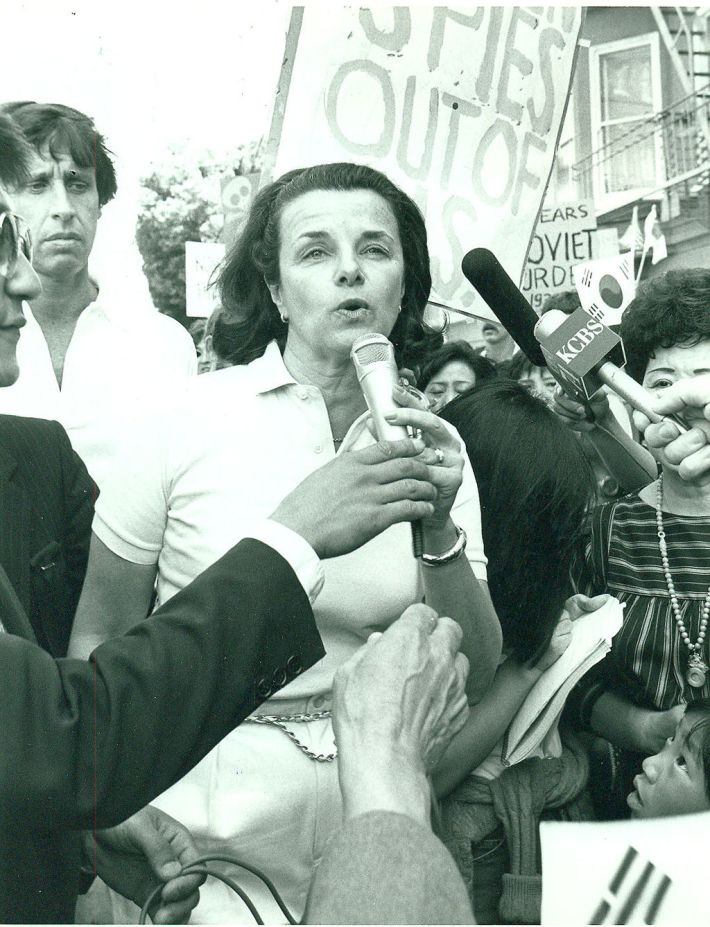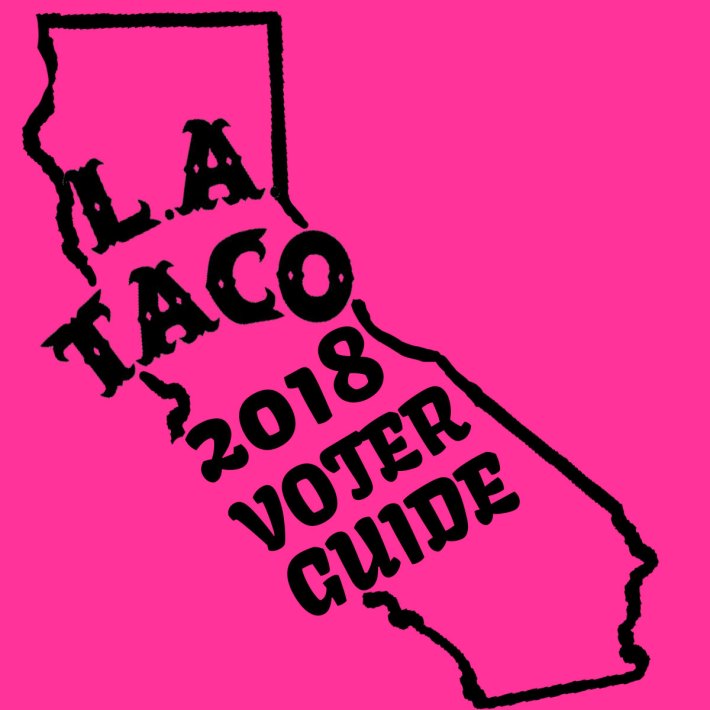Here’s Part 6 of our L.A. Taco Voter Guide, focusing on the U.S. Senate race between two Democrats, incumbent Dianne Feinstein and challenger Kevin De Leon.
[dropcap size=big]T[/dropcap]he other day Kevin de Leon, a candidate for United States Senate for California, stopped by the clubhouse in my condo complex to meet and greet potential voters.
De Leon was confident, energetic, poised. He hit all the right progressive notes, arguing for a more combative leftist approach in Washington against the rising tide of Trumpism. He needled his opponent, the senior Democratic senator from San Francisco, Dianne Feinstein. “She already works with [Republicans], she has the seniority,” De Leon told us. “We need a fighter in there.”
There was applause and cupcakes. And by the end of it, a few of my neighbors raised their hands and said they’d decided to change their vote in his favor. With small meet-and-greets like these, De Leon is making ground, but not nearly enough. Feinstein currently holds a 16-point lead over De Leon and leads among all racial groups in California, according to the latest poll by the California Institute of Public Policy.
The two recently met in a excruciatingly polite “conversation” in lieu of a debate, and De Leon got a few digs in against Feinstein, but made nothing like a needed home-run. With a week to go until Election Day, De Leon would need to appear on every television in the state — a lot, and like, since yesterday — in order to make a viable late challenge. De Leon has only $1.6 million in the bank as of the last filing period, while Feinstein has an arsenal of $21 million.
Even so, De Leon’s candidacy offers a chance to reflect on where we are in California liberal politics today, and where we might be headed.

Feinstein is a queen of the moderate wing of old-guard Democratic politics. She was in San Francisco City Hall when SF mayor George Moscone and SF supervisor Harvey Milk were assassinated on Nov. 27, 1978, sparking her political passion for gun-control. Feinstein became mayor of San Francisco and served until 1988. She won a special election to the U.S. Senate in 1992.
She and Barbara Boxer became the first female pair and the first Jewish women senators in United States history.
Today, the senior senator from California sits on the most important committees in the chamber, including the judiciary, appropriations, and select intelligence committees. She votes as a centrist, backed by the standard special-interests that have most other big Dem politicians in their sphere of influence, including the healthcare, telecommunications, and real estate industries. She supported the Patriot Act (and still supports mass surveillance) and the wars in Iraq and Afghanistan, also unsurprisingly. Feinstein in Washington is a textbook neoliberal.
In short, the senator represents a lot of what’s wrong with the Dems in the eyes of progressive Californians and fed-up independents, especially now. The country is being challenged by rabid ethno-nationalists dividing and manipulating the population from inside the White House. The status quo liberals still in power in lots of pockets of DC seem unable to come up with a real "resistance" that is forceful enough for what is actually at stake — our rights, our Constitution, our very democracy.
Watching our country go to the brink has got me thinking. How did we get here? And, do we really want or need more “experience” in Washington when the country is on fire? Well, we got here in part by watching as centrist Democrats cede space and ideological territory to Republicans, time and again, while Republicans, who vote in lock-step as a hard-right bloc, rarely cede any such space in return.
Indeed, seniority or rank — exactly the characteristics that Feinstein is running on — hardly ever seem to have actual pull for liberals when it really comes down to it.

Why Centrism Fails
[dropcap size=big]C[/dropcap]ase in point. Look at the Democrats’ and (Feinstein’s particular) mishandlings of the allegations made by Dr. Christine Blasey against Supreme Court nominee Brett Kavanaugh. Feinstein sits on the powerful Judiciary Committee, which oversaw his confirmation hearing. Centrist Democrats are supposed to be able to persuade and organize with moderate Republicans, right? But the senator’s vaunted experience couldn’t seem to prevent Kavanaugh’s success.
He made it to the bench. An alleged sexual predator is now a justice on the Supreme Court — for life. Not at Feinstein’s fault, but certainly at her enabling. On KCRW recently, De Leon pointed to a crucial Feinstein vote that procedurally allowed for the appointment of Kavanaugh to the D.C. Circuit Court of Appeals in 2006 — a traditional stepping-stone to the Supreme Court. Did she not see this coming?
“Dianne Feinstein acquiesced and collaborated with the Republicans” then, he said on the air, and she'll do it again, he argued.
Now flashback a bit and Democrats in Congress and President Obama couldn’t get us another solid justice in the Supreme Court, not even Merrick Garland, a pasty-pure “centrist” judge meant specifically to appeal to the right. Republicans refused to even consider him. Democrats, undeterred in the blind pursuit of bipartisanship, still operate like they care about what Republicans and moderates think about them, first. So, without that strong moral pillar guiding the way, they lose.
For me, Dianne Feinstein is the embodiment of that kind of Democratic politician, along with Obama, Joe Biden, and yes, Senator Kamala Harris, and of course Hillary and Bill Clinton. These are figures who behave politically as though they live on a constant paranoid edge, anxious to dodge the label of “too liberal.” They can’t ever seem to be bothered by the threat of being deemed “too conservative” — to their detriment.
However, I have to admit that I’m not especially enthusiastic about Kevin de Leon, either.

Let's Talk About Kevin
[dropcap size=big]S[/dropcap]ince he came on the scene, he’s been known as “ambitious” in California political and media circles, and a little “creepy.” True to the moment, De Leon had his associative sex scandal (did he know early enough about his roommate’s harassment allegations?) but it was quickly forgotten.
De Leon has put in the work: he organized for California teachers and worked as an immigration advocate in Pico Rivera. His campaign has tried to paint him as a hard-hitter from the left, but look closely, and he’s not too politically distant from the standard suit-and-tie L.A. Dems of his generation — Antonio Villaraigosa, Jose Huizar, Eric Garcetti, and the like.
Interestingly, De Leon backed Hillary Clinton in the 2008 and 2016 presidential primaries, not Barack Obama or Bernie Sanders. Speaking to the Union-Tribune editorial board, De Leon had the same lukewarm defenses for the housing and homelessness crises that ballooned under the Democratic establishment across our state. The leadership, including outgoing Gov. Jerry Brown and incoming likely replacement Gavin Newsom, can't excuse the problem away with more bureaucracy and bond measures: they need to own up to it.
For our purposes this Nov. 6, the California Senate race offers candidates with upbringings that in a way reflect their level of comfort with the current status quo.

Feinstein grew up on the most exclusive block in San Francisco, Presidio Terrace. She was the first Jewish student at Sacred Heart High School, and then went to Stanford, the ritziest private school on the West Coast. Kevin, in contrast, grew up in Barrio Logan in San Diego, going back and forth across to Tijuana. His mother was a housekeeper in La Jolla with a third-grade education, a point he frequently mentions on the stump. He's at all the big union and immigrant-rights rallies.
This is probably why De Leon is enthusiastic about things like single-payer healthcare and “abolishing ICE” — his compass is simply closer to the ground than Feinstein's is. Attuned to the riled-up leftist flank inside the California Dems, De Leon was endorsed over Feinstein by the state Democratic Party in July. Even if his political career ends next Tuesday, De Leon’s run represents the possibilities of another future in Washington DC, while Feinstein clearly represents, at best, more of the past.
The themes of change, difference, and “our turn” runs through De Leon’s few campaign ads, the most recent of which is a veritable tour de force of Latino-oriented California political messaging.
It runs like a mini-feature, with a slick portrayal of an immigrant mother — De Leon’s mom emigrated from Guatemala — raising a young De Leon to honor his roots and chase his dreams. Watch it below, and judge for yourself who you want representing you in the U.S. Senate.
LA Taco reporter Sam Ribakoff contributed to this report.
LA TACO VOTER GUIDE 2018:
Part 1 ~ Proposition 10 Clears Hurdle For Rent Control
Part 2 ~ Gas Tax Measure Proposition 6 Is All About Hopes of a Republican Revolt
Part 3 ~ Props 1 and 2 Are for Affordable Housing but Come at a Cost
Part 4 ~ Measure B Could Eventually Keep Local Tax Dollars Out of Major Private Banks







